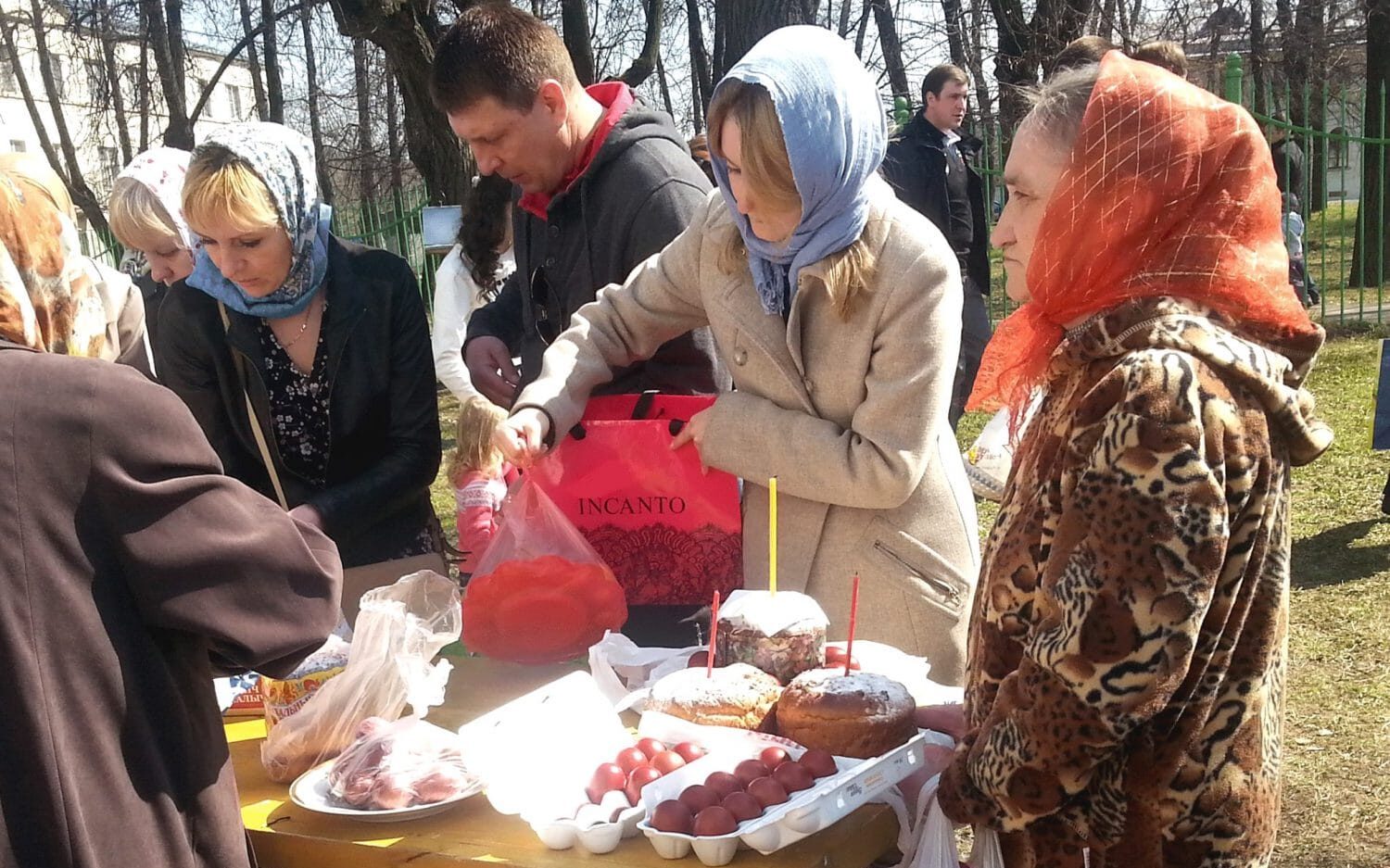Orthodox Easter is by far the most important religious holiday in most Slavic lands and is the busiest day at most Russian Orthodox churches across the globe. The holiday is steeped in history and mystic symbolism.
The following is a dual-language article meant to teach you about history and culture of Orthodox Easter while allowing students of Russian to expand their vocabularies.
| Orthodox Easter (Пасха) is sometimes referred to in Russian as “Christ’s Resurrection” (Христово Воскресение). According to polls, it is the third most popular holiday among Russians after New Year and birthdays. Easter in Russia is celebrated a little differently than in the West. | Пасха, или Христово Воскресение, как ее еще называют – это третий по популярности праздник у россиян после Нового года и дня рождения. При этом Пасха в России отмечается немного по-иному, чем на Западе. |
| Easter is preceded by Pussy-Willow Sunday (Вербное воскресенье) – a celebration of the entrance of Jesus to the temple. The Jews laid palm branches for Jesus to walk on when he entered Jerusalem. In Russia, palms don’t grow naturally (except for a small area on the Black Sea coast), but pussy-willow branches will sprout fuzzy buds at about the time of Pussy Willow Sunday. Pussy Willows are thus used in place of palms to mark this day.
In Orthodox belief, the pussy willow is a symbol of spring because it is one of the first plants to blossom. It will later have leaves, but does not sprout them yet from the fuzzy buds. According to official explanation, this “incompleteness” of the sprouting indicates that the joy from the holiday of Entrance of Lord is incomplete, but harbors the beginning of the joy of Easter and Christ’s resurrection. Pussy Willow Sunday symbolizes, on the one hand, Jesus’ recognition as the Messiah (Christ), and on the other hand — a prototype of the entrance of the Son of Man to Paradise. This day is celebrated on the last Sunday of the Lent, before Easter. |
Пасхе предшествует Вербное воскресенье – празднование входа Господа в храм. Иудеи клали на пути Иисуса пальмовые ветви при его въезде в Иерусалим. В России пальмы в природе не растут (кроме небольшой территории на побережье Черного моря), но на веточках вербы распускаются бутоны примерно во время Вербного воскресенья. Поэтому используются вербы вместо пальм, чтобы отметить этот день. Верба — символ весны, так как это одно из первых растений, которое распускается весной в России. Она таит в себе листья, но ещё не выпускает и тем даёт понять, что радость от праздника Входа Господня неполна, но таит в себе начала великой пасхальной радости. Праздник символизирует, с одной стороны, признание Иисуса Мессией (Христом), а с другой — прообраз входа Сына Человеческого в Рай. Празднуется этот день в последнее воскресенье великого поста, до Пасхи. |
| Easter is the celebration of Christ’s resurrection. For the Russian Orthodox, it symbolizes the rejoicing of the resurrection of Son of Lord, the victory of life over death, light over darkness. Russians celebrate Easter on Sunday which symbolizes that on that day – Sunday, Christ was resurrected. In Russian, the word “Sunday” (воскресенье) originated from the word “resurrected” (воскрес). | Пасха – это праздник воскресения Христа. Он символизирует радость воскресения Сына Божьего, победу жизни над смертью, света над тьмой. Россияне празднуют Пасху в воскресенье, что символизирует, что именно в этот день – воскресенье, воскрес Христос. |
| On the eve of Easter, all-night vigils and a religious procession around the church take place in all churches. Church service begins shortly before midnight. The religious procession is called “The Cross Procession” because the priest carries a cross in front of him as he starts from the church. The procession goes around the church three times while singing hymns.
At this time, bells ring – during Easter Week in all Russian Orthodox churches, anyone is allowed to go up the bell-tower and to ring. And after the end of the service, believers exchange a triple kiss — they greet each other with a kissing and the words “Christ is Resurrected!” («Христос воскресе!») This is answered with “He is truly resurrected!” («Воистину воскрес!») With this, the official part comes to an end, and the Easter feast begins. Colored eggs (крашеные яйца) and Easter bread (куличи) are used to mark all 40 days of Orthodox Easter, but are especially common during the first week. These are used as gifts as the faithful visit one another to mark the holiday. |
Накануне Пасхи во всех храмах проходят всенощные бдения и крестный ход вокруг церкви. Богослужение начинается незадолго до полуночи. Из церкви начинается и Крестный ход, названный так потому, что священник несет перед собой крест. Процессия три раза обходит вокруг церкви с пением. В это время бьют колокола — в течение пасхальной недели во всех православных церквях, любому желающему разрешается подняться на колокольню и позвонить. А после окончания службы верующие христосуются — приветствуют друг друга целованием и словами «Христос воскресе!» – «Воистину воскрес!». На этом торжественная часть заканчивается, и начинается пасхальный пир. Крашеные яйца и куличи используются для того, чтобы отмечать праздник в течение всех 40 дней православной Пасхи, а особенно на первой неделе. Их дарят как подарки, когда верующие ходят друг к другу в гости, чтобы отметить праздник. |
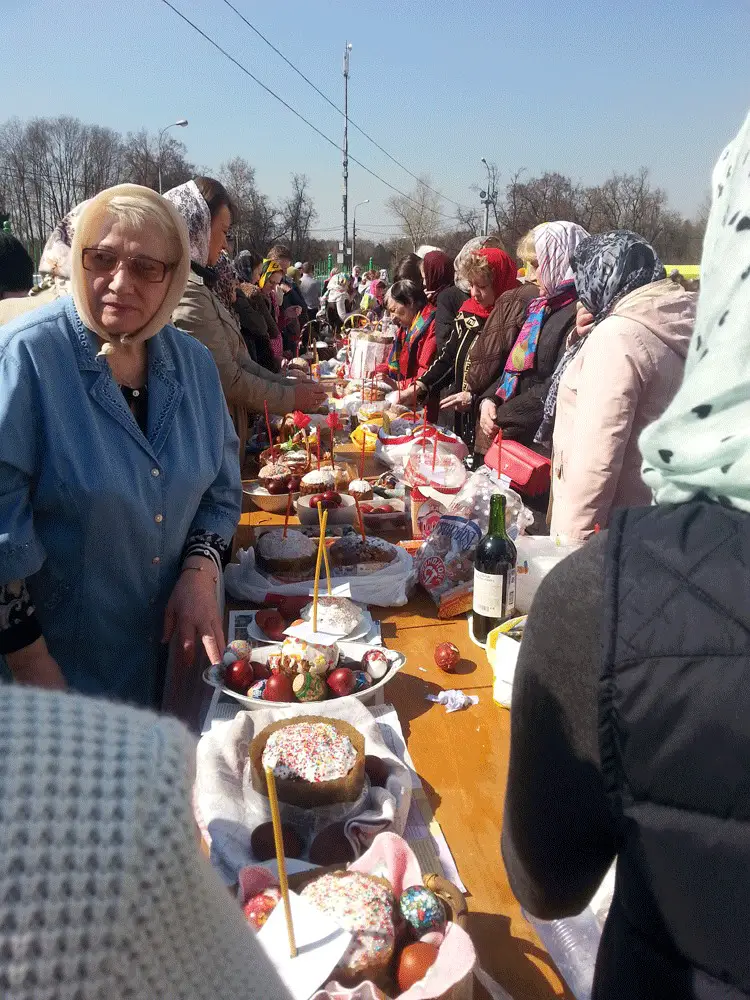 |
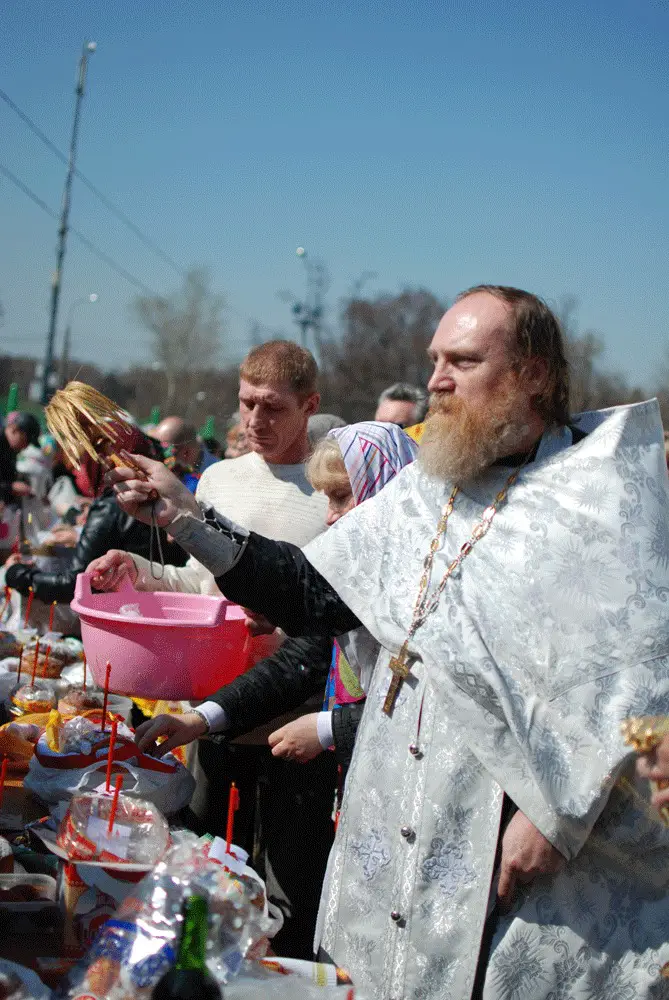 |
| Easter is celebrated for 40 days, because 40 is the ‘number of overcoming’ in Orthodoxy (Jesus Christ kept a fast for 40 days in the desert, Advent and Lent also last about 40 days each).
Easter bread symbolizes Christ’s body. Eggs are painted in different colors, but in Orthodoxy, red is traditional – it symbolizes the blood of crucified Christ. Most often, eggs are boiled with onion skins to give them this color. |
Пасха празднуется 40 дней, потому что в религии 40 – это число преодоления (Иисус Христос постился 40 дней в пустыне, около 40 дней длится Рождественский пост и Великий пост). Куличи символизируют собой тело Христа. Яйца красят в разные цвета, но в православии, красный является традиционным – он символизирует кровь распятого Христа. Чаще всего яйца варят с луковой шелухой, чтобы придать им этот цвет. |
| At the Easter feast, “egg fights” or “pecking” with eggs is popular with Russians. One person holds an egg’s end up, and another strikes it with the end of another egg. The one whose egg shell did not crack is the winner. | За пасхальной трапезой, у россиян популярны «яичные бои» или «чоканье» яйцами. Один человек держит яйцо концом вверх, а другой бьет по нему концом другого яйца. У кого скорлупа не треснула, тот – победитель. |
| Many in the West are surprised when they find out that Easter is the most popular religious holiday in Russia – even more popular than Christmas, which is widely recognized by far as the West’s most important Christian holiday. | Многие на Западе с удивлением узнают, что Пасха для россиян – настолько важный религиозный праздник, превосходящий по важности даже Рождество, которое признается самым важным религиозным праздником на Западе. |
| In the West, Easter is celebrated much more loudly and secularly than in modern Russia. In Russia, there are egg dying kits that are sold, as well as commercially produced Easter breads, but there is nowhere near the marketing bonanza that one sees in the West with various candies, plush toys, baskets, and plastic eggs. | На Западе празднуют Пасху гораздо более шумно и по-светски, чем в современной России. В России продаются наборы для крашения яиц, а также произведенная для массовой продажи пасхальная выпечка, но и близко нет такого торгового ажиотажа, как на Западе, с продажей разнообразных конфет, плюшевых игрушек, корзинок и пластиковых яиц. |
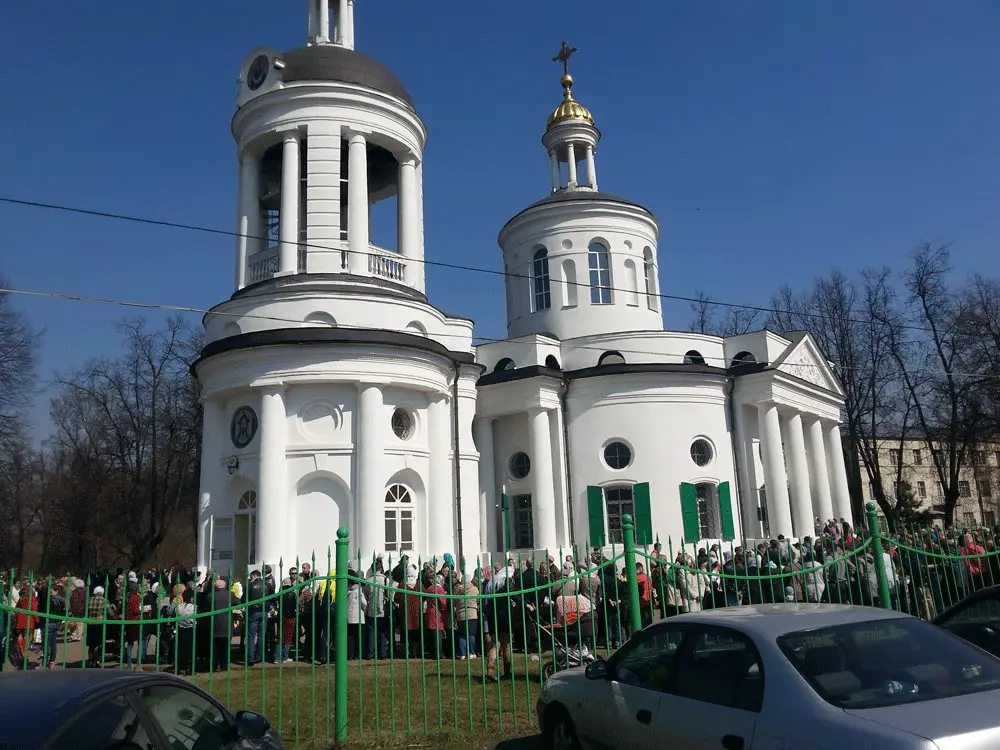
| Russia also does not have symbols of Easter that do not have direct connection to Russian Orthodoxy. Russia has no Easter Bunny, for instance. | Также в России нет символов Пасхи, которые не имеют прямой связи с русским православием. Например, в России нет такого символа Пасхи, как Пасхальный заяц. |
| Orthodox Easter is usually held on a date 1-5 weeks later than Western Easter. This is due to two factors. First, the Orthodox Church uses the Julian calendar while the rest of the world has switched to the Georgian. The two calendars differ by about two weeks. | Православная Пасха обычно празднуется на 1-5 недель позже, чем Пасха на Западе. Это происходит благодаря двум факторам. Первый, православная церковь использует Юлианский календарь, в то время как остальной мир обращается к Григорианскому. Эти два календаря различаются по времени на две недели. |
| The second is because both Orthodoxy and the Western Churches actually calculate the date of Easter by lunar cycles. So, the date changes every year in both Russia and the West because both Russian and Western governments follow calendars based on lunar cycles. Added to this is the fact that Orthodoxy believes that Easter must follow the Passover in order to follow the biblical timeline. The Western churches don’t hold to this. So, only when the appropriate lunar cycle occurs after the Passover do the two dates line up. They did so in 2017. However, it won’t happen again until 2034. | Второй связан с тем, что и Православная, и западные церкви рассчитывают дату Пасхи по лунным циклам. Поэтому дата изменяется каждый год и в России, и на Западе, так как и российское, и западные правительства следуют календарям, основывающихся на лунных циклах. Кроме того, в православии считается, что христианская Пасха должна следовать за Еврейской Пасхой, чтобы соответствовать библейской хронологии. Западные церкви не придерживаются этого. Поэтому эти две даты совпадают только тогда, когда происходит соответствующий лунный цикл после Еврейской Пасхи. Такое произойдет в 2017 году. Однако, больше этого не произойдет до 2034 года. |
| For two weeks before Light Sunday (The Day of the Resurrection of Christ) believers should sustain the Lent which is more strict than the Lent in Catholicism. Orthodox Lent lasts 48 days (Catholic Lent lasts only 40 days) and imposes very strict restrictions on animal products, for example, eating meat is forbidden during the entire Lent. | Перед Светлым воскресением (днем воскресения Христа), верующим предстоит выдержать Великий пост, который более строг, чем пост в католичестве. Православный Великий пост длится 48 дней ( католический – только 40 дней) и налагает очень жесткие ограничения на продукты животного происхождения, так, весь пост нельзя есть мясо. |
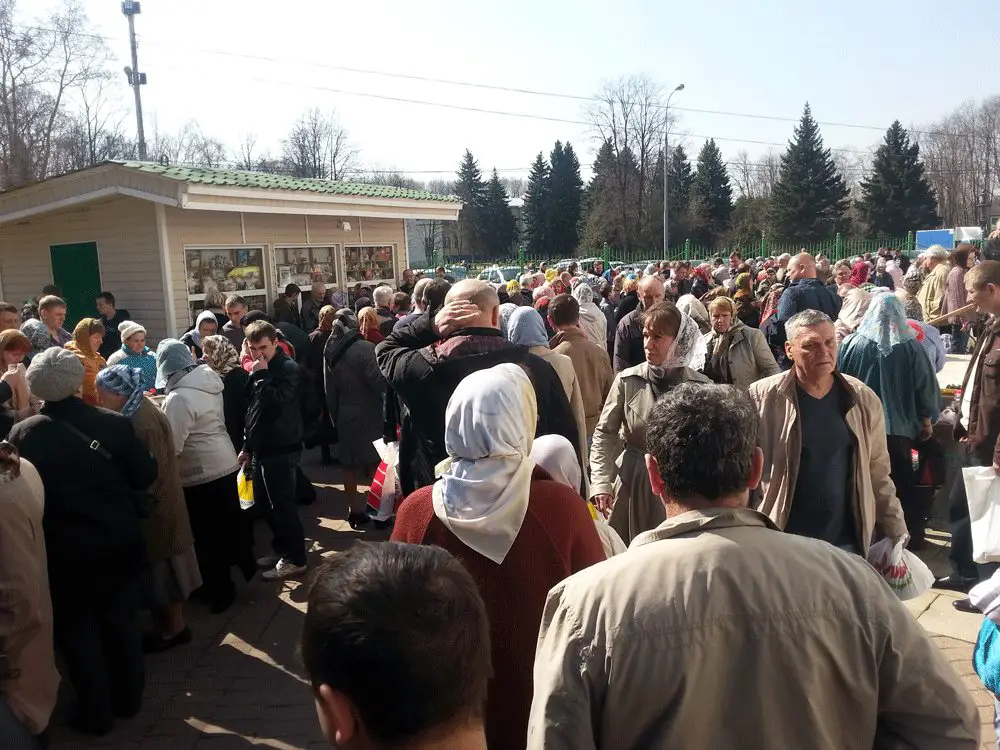
You Will Also Love
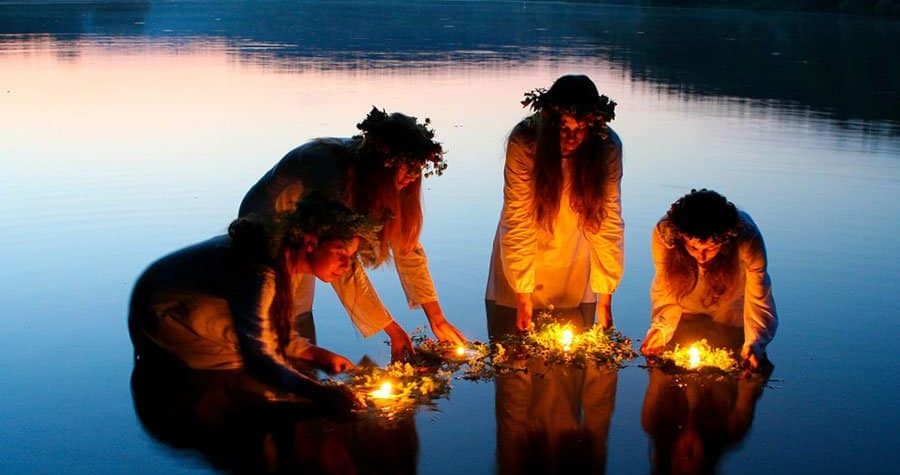
Kupala: Ancient Slavic Midsummer Mythology and its Modern Celebration
Kupala is an ancient Slavic holiday celebrating the summer solstice, or midsummer. Once part of a series of annual rituals, it marked and was believed to sustain agricultural cycles—essential to early human survival. Held as vitally important, these pagan traditions remained deeply rooted even after Christianization, technological change, and centuries of oppression tried to dislodge […]
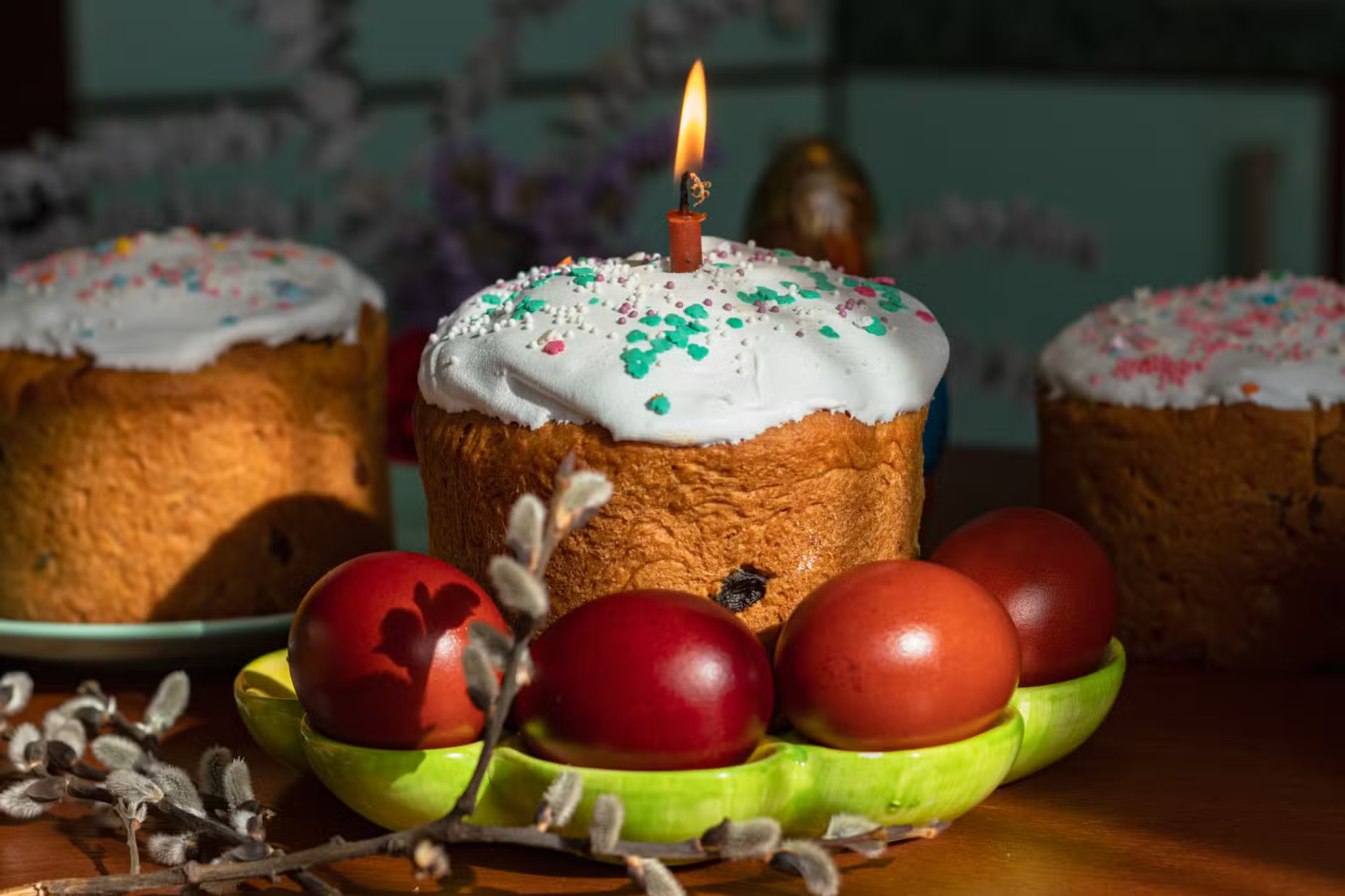
Kulich, Paska, Nazuki: The Easter Breads of Eastern Christianity
Easter breads such as kulich, paska, choreg, and nazuki are delicious Easter traditions. Easter is by far the most important religious holiday for those practicing Eastern Christianity. In addition to church services and egg dying, the holiday is also marked across the cultures by ritual bread baking. Despite the wide geographic area covered by Eastern […]
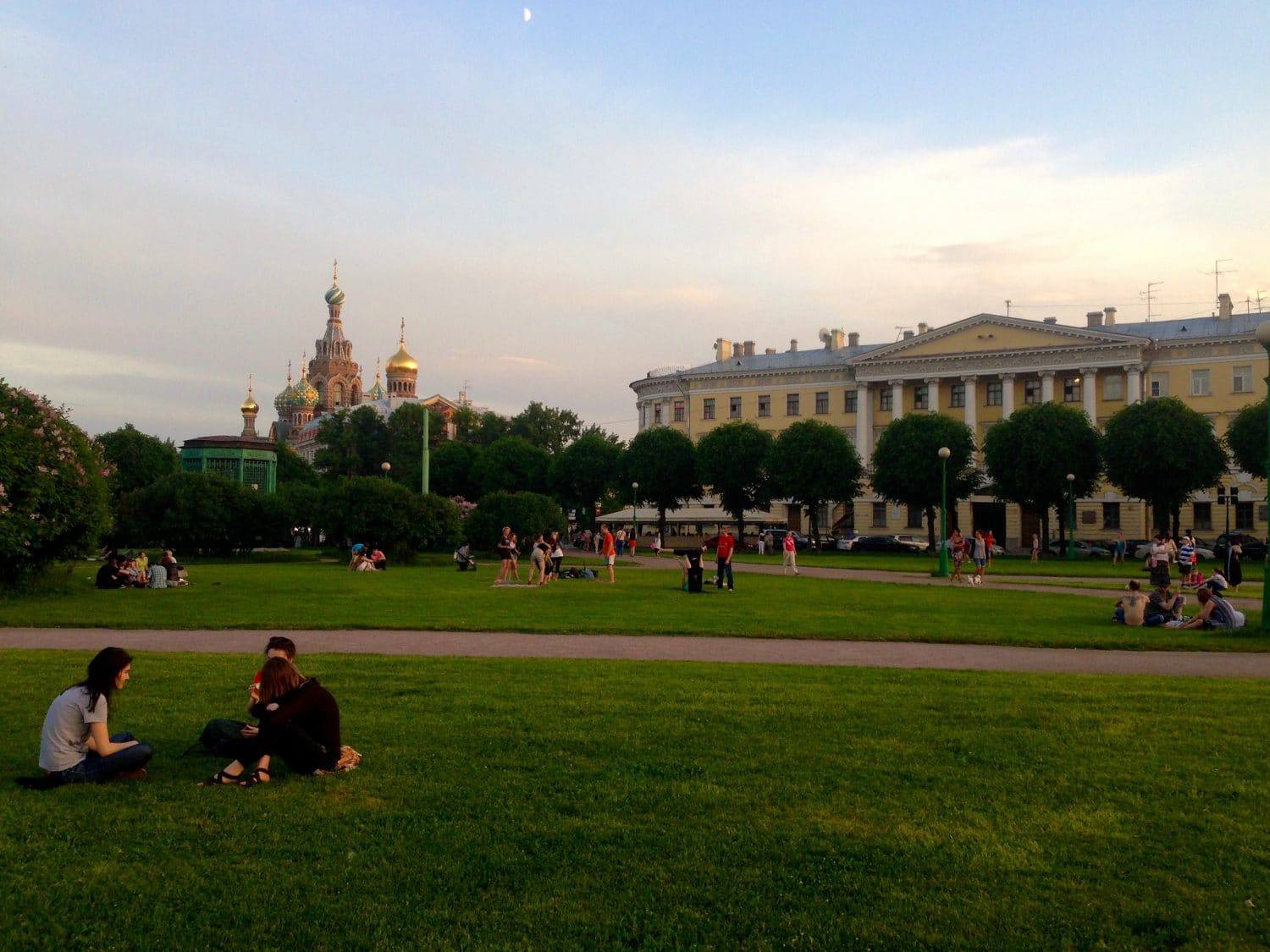
Off to Petersburg, Russia’s Cultural Capital: Моя Россия Blog
Below, Tajik blogger Roxana Burkhanova describes, in Russian, the place of St. Petersburg in Russian culture. She discusses the city’s history as well as its literary heritage, its nightlife, and even how people from Petersburg speak their own, slightly different dialect of Russian. The text was originally written in 2015 and thus references times before […]
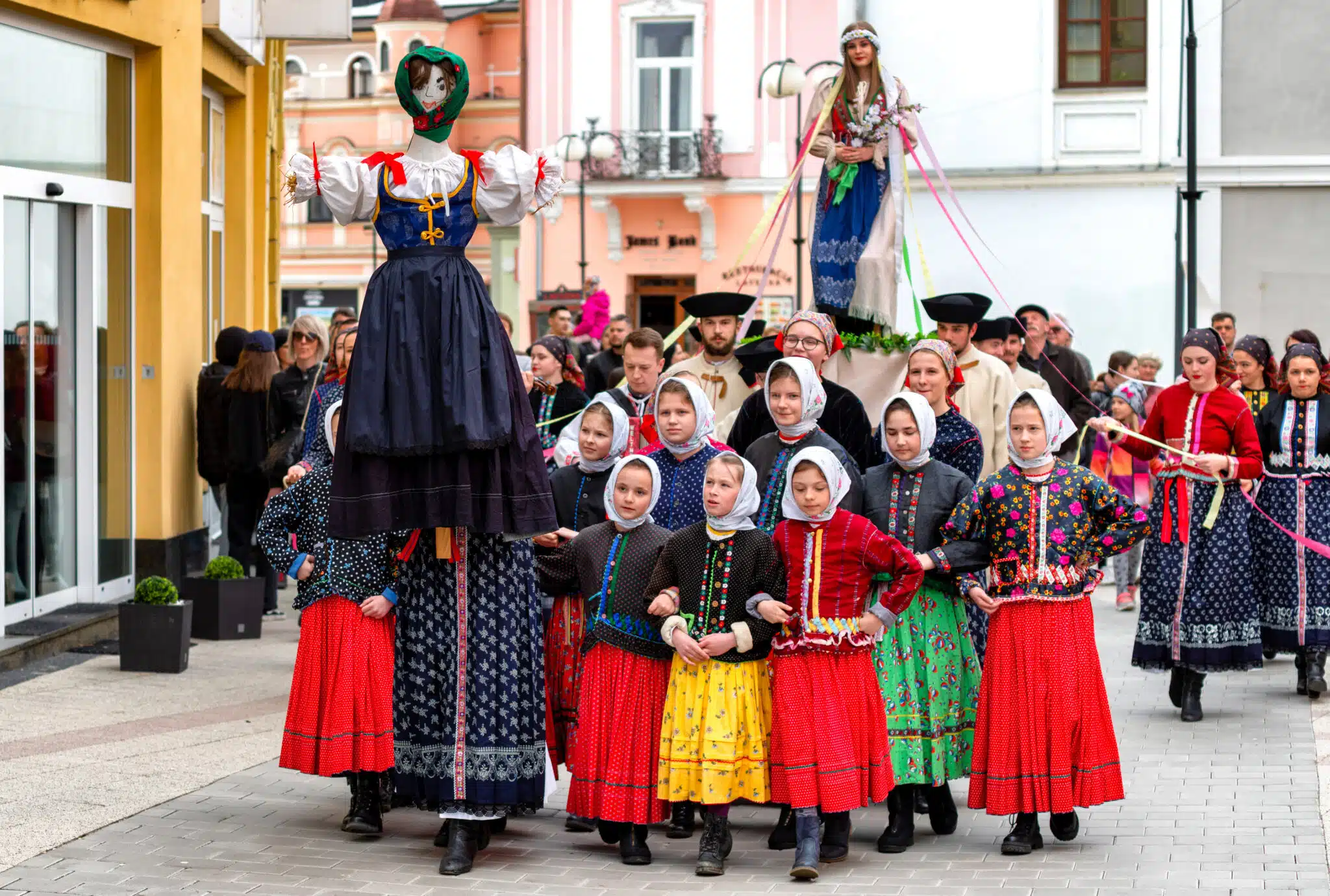
Maslenitsa, Masliana, Meteņi: Spring Holidays of the Slavs and Balts
Rites of welcoming spring and saying goodbye to winter are some of the oldest holidays preserved across Slavic cultures. In the Baltics, the celebrations were nearly lost after being suppressed by Catholic and imperial dominance. Today, Russia’s Maslenitsa is by the far the best-known, but multiple versions exist across the diverse Slavic landscape. In the […]
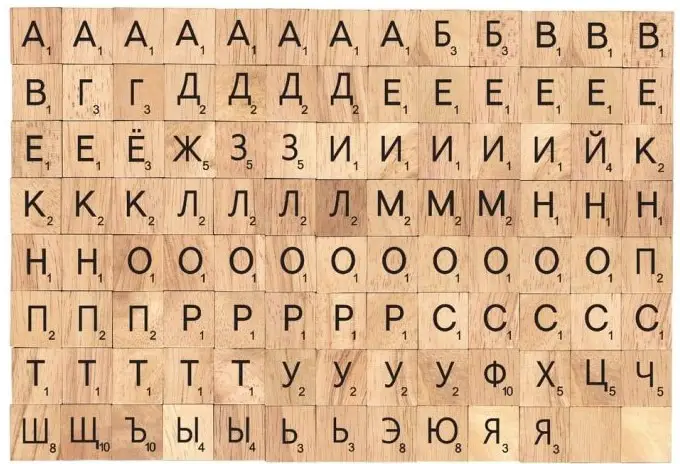
Resources for Students of Russian
This extensive list of web resources to assist students learning the Russian language was developed by SRAS and is now hosted on Folkways, part of the SRAS Family of Sites! Disclosure: Some of the links below are affiliate links. This means that, at zero cost to you, we will earn an affiliate commission if you […]

